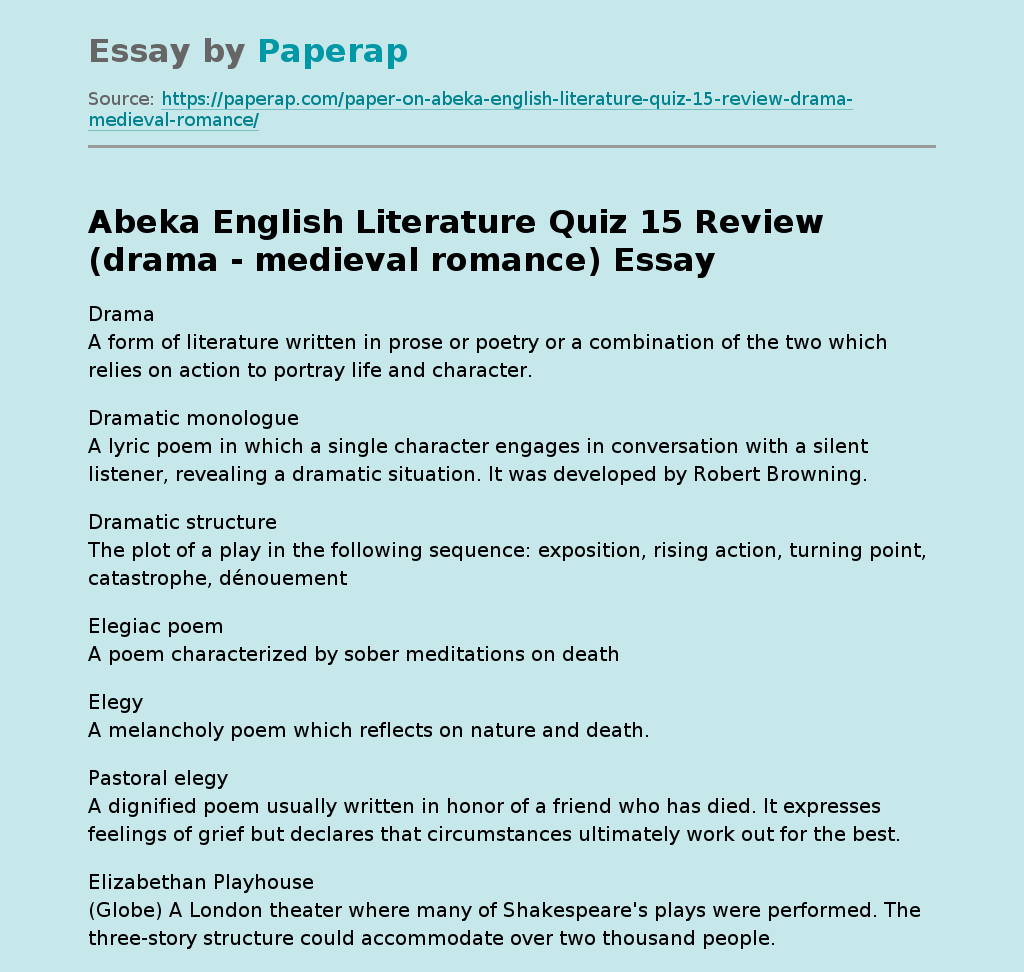Abeka English Literature Quiz 15 Review (drama - medieval romance)
Topics:
American Literature
Review,
Pages 4 (859 words)
Views
40
Drama
A form of literature written in prose or poetry or a combination of the two which relies on action to portray life and character.
Dramatic monologue
A lyric poem in which a single character engages in conversation with a silent listener, revealing a dramatic situation. It was developed by Robert Browning.
Dramatic structure
The plot of a play in the following sequence: exposition, rising action, turning point, catastrophe, dénouement
Elegiac poem
A poem characterized by sober meditations on death
Elegy
A melancholy poem which reflects on nature and death.
Pastoral elegy
A dignified poem usually written in honor of a friend who has died. It expresses feelings of grief but declares that circumstances ultimately work out for the best.
Elizabethan Playhouse
(Globe) A London theater where many of Shakespeare’s plays were performed. The three-story structure could accommodate over two thousand people.
English Reformation
The Protestant reformation in England. During this time, Henry VIII severed England’s ties with the Church of Rome and helped to establish Protestantism in England.
The Bible was also translated into English during this time.
English Renaissance
Also referred to as the Elizabethan Period (1485- 1625). During this era, England experienced a revived interest in Greek and Roman literature. Also, the Italian Renaissance greatly influenced English literature. Perhaps the most important fact of the English Renaissance was that it occurred at the same time as the English Reformation. Because the English Reformation helped to bring the biblical truth to the English, they were better able to appreciate and evaluate the literature of Greece and Rome.
Epic
A long, narrative poem based on a series of heroic adventures that are important to the advancement of a certain race or country.
Epigram
Originally, any brief poem, often used as an inscription for monuments or tombs. In modern times, it is a concise saying, often witty or satiric.
Essay
A work of moderate length in which the writer tries to develop his own thoughts on some subject. The word essay means “attempt.”
Familiar Essay
Written in the Romantic Age, an informal and more personal essay than those written in the eighteenth century. It is characterized by its intimate style; light humor or wit; emphasis on individual tastes, experiences, and opinions; and a wide range of subject matter from everyday life. The familiar essay was perfected by Charles Lamb, William Hazlitt, Leigh Hunt, and Thomas De Quincey.
Formal Essay
Used to explain scientific theories to the general public.
Exemplum
A short tale or anecdote told to teach a lesson. For example, “The Pardoner’s Tale” is an exemplum on the text “the love of money is the root of all evil.”
Exposition
Material that introduces the characters, the main conflict, and necessary background for a literary work.
Foot
The pattern in a line of poetry, consisting of one accented syllable and one or two unaccented syllables.
Free Verse
Poetry having no metrical pattern. It differs from prose only in that it is written in lines.
Georgians
Poets who lived during the rule of King George V (1910-1936) and who idealized the beauties of nature. They included Rupert Brooke, Walter de la Mare, and John Masefield.
Gleeman
A professional performer who sang poetry or recited poetry to a musical accompaniment.
Iambic Pentameter
A popular meter consisting of five iambic feet.
Idyll
A brief picture, sketch, or scene; short works describing pleasant scenes of country or domestic life.
Imagery
The use of words which appeal to the senses.
Imagism
The use of precise concrete images, free verse, and suggestion rather than complete statement.
Irish Literary Renaissance
A literary movement around the turn of the twentieth century which restored Irish Nationalism and produced great drama and poetry. The leaders were William B. Yeats, John Millington Synge, Sean O’Casey, and Padraic Colum.
Irony
The use of words to convey the opposite of their literal meaning, usually with a humorous effect.
Dramatic Irony
Contrasting what a character says and what a reader or audience knows to be true.
Irony of Situation
Presenting a discrepancy between appearance and reality or between expectation and fulfillment.
Verbal Irony
Saying the opposite of what is meant.
Kenning
Metaphorical, compound words or phrases that refer to persons, places, or things. Kennings are a characteristic of Anglo-Saxon poetry.
Lyric
A short poem characterized by emotion, melody, and imagination; germinated during the medieval period and brought to maturity during the Elizabethan period.
Lyrical Poetry
Characterized by a positive attitude toward life, an awakening to feeling, a love for nature, and an emphasis on personal expression.
Madrigal
A popular love song during the Elizabethan Age. It consisted of five or six voice parts sung independently, without accompaniment, and woven into an intricate pattern.
Medieval Romance
A narrative form popular during the medieval period; this form of writing is based primarily on the adventures of knights, kings, or distressed ladies. The themes include love, religious faith, the desire for adventure, and often an involvement with supernatural forces. Often, the main character sets forth on a quest or journey and meets with distracting adventures along the way. Examples of a medieval romance include Sir Gawain and the Green Knight, Morte Darthur, and other Arthurian legends.
Abeka English Literature Quiz 15 Review (drama - medieval romance). (2018, Jan 05). Retrieved from https://paperap.com/paper-on-abeka-english-literature-quiz-15-review-drama-medieval-romance/

